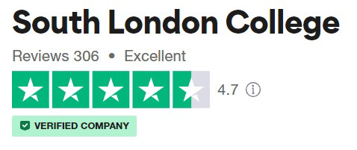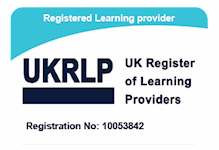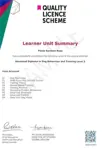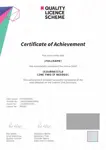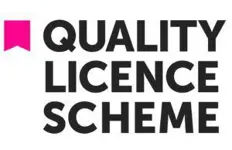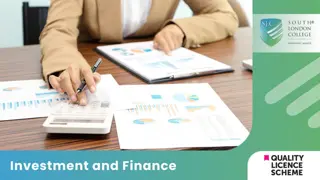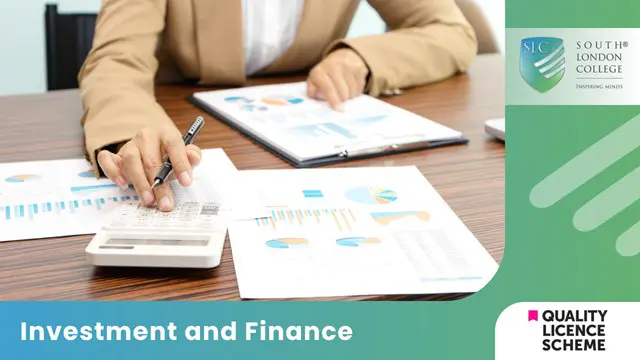
Investment and Finance Diploma
Level 3 Diploma | Endorsed by Quality License Scheme | QLS Endorsed Certificate Included
South London College
Summary
- Certificate of completion - Free
- Exam(s) / assessment(s) is included in price
- Tutor is available to students
- TOTUM card available but not included in price What's this?
Add to basket or enquire
Overview
Diploma in Investment and Finance - Level 3
Finance and investment go hand in hand. It is vital to be well versed with finance to make effective investment decisions, which is why South London College has brought this diploma in Investment and Finance – Level 3 to help whoever is involved with finance and investment. All the aspects of finance and investment will be amply covered through this comprehensive course, opening various employment or progression opportunities for you within the industries
This course starts off with an introduction into finance and investment to enlighten you on the role, duties and responsibilities of a finance or investment professional. This course will then delve into topics such as investment assumption, investment evaluation methods, investment motives and investment critical values, after which you will be taught on how to choose between different investment methods to gain maximum profits or income.
This course will then focus on the finance aspect of this course by walking you through concepts such as financial planning, financing considerations, financial models, loan evaluation and many more. You will also get to learn about cash flow statements, loan amortization, fiscal policy issues and taxation, all the while understanding the best practices to create efficient financial models. By the end of this course, you will have a strong grip on finance and investment to make substantial progress in your career.
The course has been endorsed under the Quality Licence Scheme. The completion of this course alone does not lead to a regulated qualification* but may be used as evidence of knowledge and skills gained. The Learner Unit Summary may be used as evidence towards Recognition of Prior Learning if you wish to progress your studies in this subject. To this end the learning outcomes of the course have been benchmarked at Level 2 against level descriptors published by Ofqual, to indicate the depth of study and level of demand/complexity involved in successful completion by the learner.
Eligible for TOTUM card - TOTUM is the #1 student discount card and app giving you access to exclusive student deals on food and fashion, tech and travel and everything in between.
*Regulated qualification refers to those qualifications that are regulated by Ofqual / CCEA / Qualification Wales
Achievement
Course media
Description
What Will I Learn?
- Gain a clear understanding of your job role in finance and investment with clear objectives in mind.
- Understand how to use best practices to create financial models.
- Analyse and understand cash flow statements.
- Gain an in-depth understanding of what investment banking is
- Learn how to identify fiscal policy issues.
- Learn about investment and taxation.
COURSE CURRICULUM
Module 01: Investment
- Investment
- Introduction to Investment
- Conclusion
Module 02 : Investment Assumption
- Investment Assumption
- Introduction
- Time of Investment and Start of Business
- Cash Earnings
- Cash Investments
- Taxes
- Interest Amounts
- Relevant Amounts
- None Committed Amounts
- Opportunity Amounts
- Marginal Amounts
- Discount Rate
- Investment Horizon
Module 03 : Investment Evaluation Methods
- Investment Evaluation Methods
- The Net Present Value Method
- Internal Rate of Return Method
- The Annuity Method
- The Pay- Back Method
Module 04 : Investment Motives
- Investment Motives
- Investment in Additional Capacity
- Investment in a New Project
- Rationalization Investments
Module 05 : Critical Values in Investment
- Critical Values in Investment
Module 06 : Choosing Between Investment Evaluation Methods
- Choosing Between Investment Evaluation Methods
Module 07: Investments and Taxation
- Investments and Taxation
- Introduction
- General Assumptions on Taxes
Module 08 : Investment and Inflation
- Investment and Inflation
- Introduction
- Investment Including Inflation- One Inflation Rate
- Investment Including Inflation- Multiple Inflation Rates
Module 09 : Investment and Working Capital
- Investment and Working Capital
- Introduction
- Including Working Capital in Investment Evaluations
Module 10: Replacement of Investments
- Introduction
- The no- Replacement Situation
- The Identical Replacement Situation
- Replacement of Old Technology With New Technology
Module 11 : What to Include In Real Life
- What to Include in Real Life?
Module 12 : Financing
- Financing
- Introduction
- Equity Financing
- Debt Financing
Module 13 : Financing Considerations
- Financing Considerations
- Introduction
- Business Environment
- Stable Business Environment
- Dynamic Business Environment
- Load Terms
- Loan Period
- Nominal Value
- Interest and Commission Costs (Cost and Risk)
- Calculation of Proceeds
- Loan Repayment (Liquidity)
- Extension of Repayment (Flexibility)
- Early Repayment (Flexibility)
- Currency ( Risk and Cost)
- Loan Termination and Loan Governance
Module 14 : Amortization of Loans
- Amortization of Loans
- Introduction
- Standing Loan (Bullet Loan)
- General Characteristics
- Amortization of a Standing 14. Loan (Bullet Loan)
- Serial Loan
- General Characteristics
- Amortization of a Serial Loan
- Annuity Loan
- General Characteristics
- Amortization of an Annuity Loan
Module 15: Evaluation of Loan
- Evaluation of Loan
- Introduction
- Evaluation of a Standing Loan (Bullet Loan)
- Evaluation of a Serial Loan
- Evaluation of an Annity Loan
- Evaluation Loans- Overview
Module 16 : Evaluation of Other Credit
- Evaluation of Other Credit
- Introduction
- Overdraft Accounts (Non- Scheduled Amortization)
- Trade Creditors
Module 17 : Financial Planning
- Financial Planning
- Introduction
- Finding the Right Financing Package
- Evaluation of Cost of The Financial Package
- Evaluation of Financing Package 1
- Evaluation of Financing Package 2
- Evaluation of Financing Package 3
- Conclusion of Evaluation of Financing Package
Other Considerations
Access Duration
The course will be directly delivered to you, and you have 12 months access to the online learning platform from the date you joined the course. The course is self-paced and you can complete it in stages, revisiting the lectures at any time.
Method of Assessment
In order to complete the Diploma in Investment and Finance - Level 3 successfully, all students are required to complete a series of assignments. The completed assignments must be submitted via the online portal. Your instructor will review and evaluate your work and provide your feedback based on how well you have completed your assignments.
Certification
At the end of this course successful learners will receive a Certificate of Achievement from Quality Licence Scheme and a Learner Unit Summary (which lists the components the learner has completed as part of the course).
Course Code: QLS-04461
Awarding Body (Accreditation)
The Quality Licence Scheme has long-established reputations for providing high quality vocational qualifications across a wide range of industries. The Quality Licence Scheme combines over 180 years of expertise combined with a responsive, flexible and innovative approach to the needs of our customers.
Renowned for excellent customer service, and quality standards, The Quality Licence Scheme also offer regulated qualifications for all ages and abilities post-14; all are developed with the support of relevant stakeholders to ensure that they meet the needs and standards of employers across the UK.
Who is this course for?
- Accounts Executives
- Accountant, Accounts Manager
- Students of Accounting
- Tax Accounting learners, Investment Bankers, Finance Managers
- Anyone who is looking to gain a knowledge and skills in Investment and Finance.
Requirements
- Learners should be age 19 or over, and must have a basic understanding of Maths, English, and ICT.
- A qualification at level 2 or above in any discipline.
Career path
- Accountant – £28,565 per annum
- Accounting Manager - £31,357 per annum
- Tax Accountant – £29,001 per annum
- Accounts Executive – £22,243 per annum
- Staff Accountant – £24,115 per annum
- Investment Banker – £54,640 per annum
- Accounting Assistant – £20,352 per annum
- Accounts Assistant – £18,883 per annum
- Finance Assistant – £19,343 per annum
Questions and answers
I only have gcse and a levels To do a level 3 diploma course do I have to do priar levels
Answer:Dear Ixa, Thank you for your interest! We understand that you hold GCSE & A levels and according to the UK qualifications / HE levels, they total to a level 3 qualification. This course requires you to have a level 2 qualification or above; hence if you fulfill the rest of the criteria, you are certainly eligible to take this course. Should there be any other information you require, please contact us. Best regards, Learner Support Team, South London College.
This was helpful.Do I receive any UCAS points after completing this course
Answer:Dear Rushil, Thank you for your query. No you wont receive any UCAS Points. However Successful learners can claim the CPD Accredited Certificate in the following formats: Digital format (PDF) will cost you £29. Printed Format will cost you £39. Regards, Student Support Team
This was helpful.
Certificates
Certificate of completion
Digital certificate - Included
Reviews
Currently there are no reviews for this course. Be the first to leave a review.
Legal information
This course is advertised on reed.co.uk by the Course Provider, whose terms and conditions apply. Purchases are made directly from the Course Provider, and as such, content and materials are supplied by the Course Provider directly. Reed is acting as agent and not reseller in relation to this course. Reed's only responsibility is to facilitate your payment for the course. It is your responsibility to review and agree to the Course Provider's terms and conditions and satisfy yourself as to the suitability of the course you intend to purchase. Reed will not have any responsibility for the content of the course and/or associated materials.

